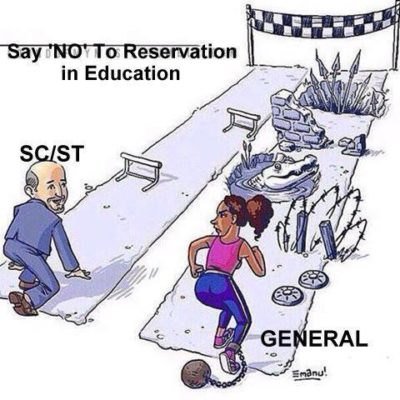India AGAINST Reservation
“Give a man a fish, you feed him for a day; teach him how to fish, you feed him for a lifetime”. - Anonymous
India is a country with endless myths and social barriers. Caste system is a major basis of the social division and its origin can be dated back to the Vedas. Since the British Raj, this holy land was torn apart into pieces in the name of castes and sub-castes. So, efforts were made to implement certain reservation policies for the benefit of backward classes of people. After Independence, the Constitution of India has given certain let-offs and relaxations to a “depressed class” of people led by Ambedkar. Since then, the policy has continued and has become an important issue of national importance. Keeping the current situation in view, it is not a matter of concern whether Mr. Ambedkar is the Father or The Godfather of the Indian Constitution. Ambedkar noticed that most of the higher offices were occupied by people from upper castes, and the Brahmins enjoyed the cherries at the top. So, the system of reservation was introduced to create a level playing ground for all sections of people with equal opportunities. But this system was not meant to be a never ending policy.
Reservation must be based on economic status of people rather than caste system. If an individual from a weaker section of the society is helped financially, or provided free requirements, he/she may utilize them well and succeed in life. However, lowering the level of qualification may not be beneficial for the cause of the society. A poor student from ‘General’ category deserves assistance from the reservation system more than an SC/ST student from a rich background. But, the current scenario in the country is exactly the opposite of the above instance. This system will never create positive equality in the society. Reservation may end if it is limited to only one generation, and from the next generation onwards, a check is put on the economic status.
One will not oppose the system if the system delivers true results. Unfortunately, the policy has been operating with a lot of loopholes. From the political point of view, reservation policy has been an easy target to create ‘vote-banks’. Had the system worked with its full potential, India would have been a superpower like the US. Rather than working on reservation system, what the country actually needs is upliftment, and that should be irrespective of caste. Unless we can dissolve caste barriers, such problems are irreparable. India would be a great nation if people give up reservation, and merit is given top priority in every field irrespective of caste or creed. In literal sense, reservation policy is like a football game where one team is 1-0 up even before the game has started. In the context of the present day, the situation has become such that people plan to move into the reserved category to enjoy the facilities rather than having a chance almost equal to none.

For instance, in the national civil services exam, the number of attempts for appearing has been fixed as: 4 for General, 7 for OBC, and no restrictions till 37 years of age for SC/ST. But this fact does not make sense at all. Whatever be the reason, it must be clearly verified. Same is the case with promotion in jobs and getting admission into institutions of higher studies. All these obligations reflect a negative picture of the policy. The Indian Constitution gives every child his right to education, and no where expresses that any child belonging to a backward class has a little more of this right than one belonging to the ‘General’ category.

Reserving one category against another creates a feeling of division which results in a chaotic situation with every small section of the society asking for it. In this 21st century, all eyes are on India as this great nation emerges as a global superpower. So to reduce the differences, we should rethink the current concept of caste based reservation and come to a mitigable solution.
(This article is based on the author’s views of the caste based reservation policy in India. In no way it aims to hurt the sentiments of the people of any caste or creed in India)